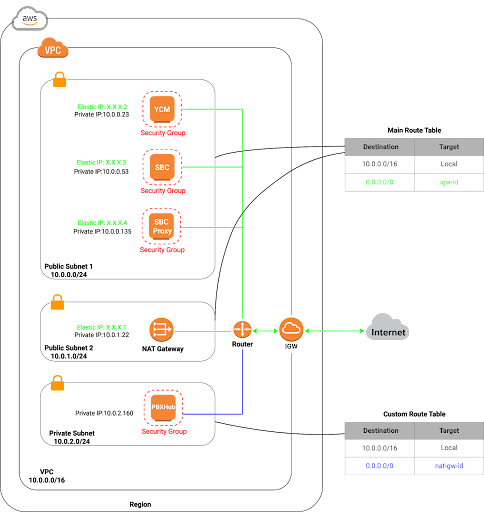What is an Elastic IP?
An Elastic IP address, also known as a Flexible IP address, is a static public IP address that can be associated with an EC2 or Azure instance or network interface in your cloud account. Elastic IP addresses are an invaluable tool for helping run your cloud infrastructure efficiently, as they provide several benefits over dynamic IP addresses:
- Static IP addresses are easier to remember and use, as they do not change. This can be helpful for connecting to your instances from outside of the Cloud network, or for setting up DNS records for your domain.
- Static IP addresses can be associated with multiple instances, which can be useful for failover scenarios. If an instance fails, you can quickly and easily associate the Elastic IP address with another instance, ensuring that your application remains available.
- Static IP addresses can be allocated and released as needed, which can help to reduce costs. You only need to pay for the Elastic IP addresses that you are actually using.
How does an Elastic IP work?
An Elastic IP address is allocated to your Cloud account and is associated with a specific instance or network interface. When the instance or network interface is assigned an Elastic IP address, it becomes accessible to the internet using that address. If the instance or network interface is stopped or terminated, the Elastic IP address remains allocated to your account and can be associated with another instance or network interface.
Here is a diagram of how an Elastic IP works:
How can I use an Elastic IP?
There are many ways to use an Elastic IP address. Here are a few examples:
- Connect to your instances from outside of the Cloud network: You can use an Elastic IP address to connect to your instances from a remote computer, such as a laptop or desktop. This can be helpful for troubleshooting or for managing your instances.
- Set up DNS records for your domain: You can use an Elastic IP address to set up DNS records for your domain. This will allow users to access your application using a URL, such as www.example.com, instead of using the IP address of your instance.
- Implement failover: You can use Elastic IP addresses to implement failover for your applications. If an instance fails, you can quickly and easily associate the Elastic IP address with another instance, ensuring that your application remains available.
Benefits of using an Elastic IP
There are many benefits to using an Elastic IP, including:
- Improved application availability: Elastic IP addresses can help to improve the availability of your applications by providing a static IP address that can be used to failover to another instance in the event of an outage.
- Reduced downtime: Elastic IP addresses can help to reduce downtime by making it easier to troubleshoot and recover from outages.
- Simplified DNS management: Elastic IP addresses can simplify DNS management by providing a static IP address that can be used to set up DNS records for your domain.
- Increased security: Elastic IP addresses can help to increase the security of your applications by providing a static IP address that can be used to restrict access to your applications.
Reasons why it’s cool for the Load balancer to be able to control the Elastic IP endpoint
There are several reasons why it is useful for a load balancer to be able to change its Elastic IP address. Here are a few of the most important reasons:
- Adaptive Failover Management: Allows for quick re-routing of traffic in load balancer contingencies, maintaining application availability.
- Seamless Maintenance Operations: EIPs enable uninterrupted service during load balancer maintenance by redirecting traffic.
- Enhanced Security Configurations: In conjunction with security groups, EIPs can fortify the security perimeter around load balancers.
- Isolated Testing Environments: Facilitate the creation of separate testing or development load balancers, ensuring production environment integrity.
Elastic IPs are a fundamental component in the Cloud-vendor toolkit, offering enhanced flexibility, reliability, and security for cloud-based services. Their strategic use in failover scenarios, coupled with cost-effective allocation, makes them an indispensable resource for efficient cloud infrastructure management.
What is the primary purpose of an Elastic IP address in AWS?
An Elastic IP address in the Cloud serves as a static public IP associated with your instances or network interfaces. It enhances accessibility, aids in setting up DNS records, and allows for efficient management of cloud infrastructure.
Can an Elastic IP be associated with multiple instances, and why is this beneficial?
In general, no it cannot as you need to use the Cloud vendor provided load balancer to do this, and this can be cost-prohibitive to use. However, there are solutions such as Edgenexus’s free of cost, HA Cloud Connector that allow you to switch Elastic IPs between a load balancer HA pair.
How does an Elastic IP contribute to reduced costs in AWS?
Elastic IPs can be allocated and released as needed, allowing you to pay only for the addresses you use. This flexibility in allocation helps manage costs efficiently.
Why is it cool for a Load Balancer to control the Elastic IP endpoint?
Allowing a Load Balancer to control the Elastic IP facilitates adaptive failover management.
How do Elastic IPs contribute to improved application availability and reduced downtime?
Elastic IPs, with their static nature, contribute to improved application availability by enabling quick failover to another instance during outages. This static IP also aids in reducing downtime by simplifying troubleshooting and recovery processes.
What makes Elastic IPs indispensable for efficient cloud infrastructure management?
The strategic use of Elastic IPs in failover scenarios, combined with cost-effective allocation, makes them a fundamental and indispensable resource for achieving flexibility, reliability, and security in cloud-based services.











